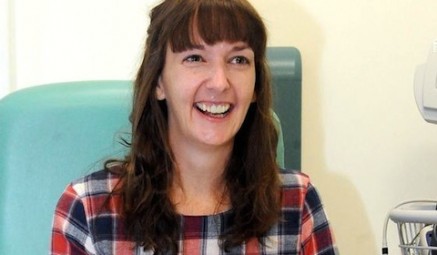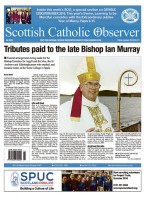October 15 | ![]() 0 COMMENTS
0 COMMENTS ![]() print
print

Paisley bishop asks for prayers for Pauline Cafferkey, Scottish nurse critically ill with ebola
Bishop John Keenan of Paisley is calling for prayers for the Scottish nurse who is critically ill with late complications from the ebola virus.
“Let’s pray a daily Hail Mary again for nurse Pauline Cafferkey, sick with the effects of the ebola virus, for her to make a speedy and full recovery and for her family to feel the strength of our spiritual support in these trying days for them,” the bishop said today as the condition of the UK’s first ebola patient deteriorates.
Pauline Cafferkey, 39, from Cambuslang, South Lanarkshire, was diagnosed with ebola last December after returning to Glasgow via London from working in Sierra Leone. After almost a month of treatments in an isolation unit at London’s Royal Free Hospital, she was discharged in late January. The nurse, who recently received a Pride of Britain award in London, had returned to work as a public health nurse at Blantyre Health Centre in South Lanarkshire and had been well enough last Monday to visit Mossneuk Primary School in East Kilbride to thank children for their fund-raising efforts.
After feeling unwell, however, Ms Cafferkey (above) went to an out-of-hours doctor in Glasgow later last Monday, but was sent home after being told she probably had a virus. Her family claimed doctors ‘missed a big opportunity’ to spot she had fallen seriously ill again. She was, however, admitted to the city’s Queen Elizabeth University Hospital the following day before being transferred to to the isolation unit the Royal Free on Friday by military aircraft.
In a statement the Royal Free says: “We are sad to announce that Pauline Cafferkey’s condition has deteriorated and she is now critically ill. She is being treated for ebola in the high level isolation unit.”
Health Secretary Jeremy Hunt used social media to express his concerns and support for the nurse.
“Sad to hear of deterioration in Pauline Cafferkey’s condition,” Mr Hunt posted Twitter. “Thoughts and prayers with her and [the] wonderful team looking after her at the the Royal Free Hospital.”
Medical experts know that that the human body can harbour the ebola infection months after a patient’s apparent recovery.
Dr Ben Neuman, a virologist at Reading University, said that the medical team treating Ms Cafferkey was in ‘completely uncharted territory.’
“We don’t know what ebola looks like the second time around or after a big relapse like this,” he said. “Right now, she has had this virus about three times as long as the other previous record holder.”
“It is bad news, but it is not hopeless news. As long as she is still there, and as long as she is still fighting, there is a chance… What we are seeing right now is essentially a frustrated immune system overreacting and basically hurting some of the other organs.”
Ms Cafferkey kept a moving diary recording experiences on the frontline last year against the deadly disease in Sierra Leone.
“I feel sorry for the poor patients who have these alien-type people caring for them,” her diary reveals. “Especially so for the young children, who are not only very sick but have these strange creatures with only their eyes visible trying to make them drink and take medications.”
The ebola outbreak in west Africa has killed 11,312 of the 28,457 people infected since December 2013, according to the latest WHO figures.











